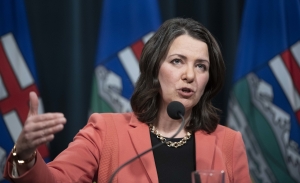Clean Energy Canada | Ottawa-Alberta "grand bargain” could trade away Canada’s climate framework if firm negotiations don’t follow
November 27, 2025

TORONTO — Rachel Doran, executive director at Clean Energy Canada, made the following statement in response to the Canada-Alberta Memorandum of Understanding regarding a new energy deal:
“Today’s MOU with Alberta will require the federal government to negotiate firmly in the months ahead. Canada must work diligently to ensure it is not trading future climate promises that, as history suggests, could be reneged on in exchange for higher oil- and gas-related emissions today.
“Prime Minister Carney’s government risks trading certainty for expediency as it puts regulations with hard pollution limits—in this case, the Clean Electricity Regulations, oil and gas emissions cap, and methane regulations—on the negotiating table with provinces.
“Alberta had already agreed to increase its industrial carbon price by the terms of its last negotiation with Canada in 2018 in exchange for the Trans Mountain Expansion Project, so while today’s agreement does have some potential for good negotiated outcomes, it risks fundamentally undermining the durability of key federal regulations. If one province can be granted an exemption, any province can.
“Canadians should ensure that Prime Minister Carney holds firm on his statement that private proponents will shoulder the cost of any future pipeline in Canada. Going forward, the world will be using less and less oil after 2030, according to the International Energy Agency. Canada should therefore be putting public dollars toward the industries that will be growing, rather than those set to shrink. Globally, investment in clean energy has accelerated, and spending on renewable power, grids, and storage is now higher than total spending on oil, gas, and coal. The world now invests twice as much in clean energy as it does in fossil fuels.
“We were, however, cautiously optimistic to see potential in a number of key climate commitments integrated as part of this deal and the near-term timelines on which these need to come into effect.
“Alberta’s pledge to increase its industrial carbon price to $130/tonne could be a meaningful one, as that price would be higher than the federal backstop price currently scheduled to kick in next year ($110/tonne), but only if Alberta also works in good faith to address issues around stringency and helps ensure the market price of credits also rises. This also needs to be supported by the even bigger opportunity that a more unified industrial carbon market across Canada represents, something the federal government has promised to explore, and one that Alberta has an opportunity to lead.
“Given the importance of clean electricity to Canada’s economic future and the risk of setting a dangerous precedent where provinces can opt out of Canada’s climate regulations as they please, any deal related to the implementation of Canada’s clean electricity regulations in Alberta must be in the form of an equivalency agreement and not a provincial carveout.
“The electricity-infrastructure-related elements of today’s energy deal could also be significant if done right. Transmission interties from B.C. to Saskatchewan and a commitment to building thousands more megawatts of power could be the nation-building project Canadians have been waiting for, simultaneously building on Canada’s clean energy advantage, enhancing energy security, and lowering energy bills for Canadian households. But these new megawatts must be clean, leveraging the complementary renewables strengths and lowest-cost power sources that are already being deployed in B.C. and Alberta today—hydro, solar, and wind plus battery storage—as opposed to waiting on a future nuclear strategy that might add higher-cost power resources someday.
“Indeed, Alberta would also benefit, perhaps even disproportionately, from doubling down on a clean energy future. Modelling has shown that Alberta’s clean energy sector would be the fastest growing of any province or territory in Canada, with jobs increasing 10% every year in a net-zero future. And until recently, Alberta led Canada and much of North America in attracting renewable investment. But as a result of a moratorium and new restrictive regulations on renewables, the province has fallen to the bottom of the list in Canada on clean energy procurements, losing out on some 11 gigawatts of clean power (an amount that exceeds Alberta’s average total power demand) and tens of millions in community tax revenue.
“As negotiations on the implementation details of this MOU proceed in the coming months, Canada must keep both history and the future in mind. That means learning lessons from our past while aligning Canada with where the world is headed. It means shaping Canada into a lasting energy superpower, not just putting out the political fires of today.”